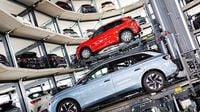In April 2025, the VW Group solidified its dominance in the German electric car market, while Tesla's dramatic decline continued, leading it to fall out of the Top 10 rankings. According to data from the Kraftfahrt-Bundesamt, Volkswagen's core brand achieved an impressive 9,725 new registrations of pure electric vehicles, well ahead of its competitors.
Skoda emerged as a surprising contender, securing the second position with 4,216 new registrations, narrowly surpassing BMW, which recorded 4,151 registrations. This shift marks a significant change in the competitive landscape of electric vehicles in Germany, as Skoda's new Elroq model has garnered considerable interest among consumers.
Audi and Seat also contributed to the VW Group's success, ranking fourth and fifth respectively, with 3,390 and 3,196 new electric cars registered in April. Mercedes-Benz followed in sixth place with 2,626 registrations. The dominance of VW and its subsidiaries is evident, with nearly half of all new electric cars sold in Germany coming from the VW Group.
The overall market share for the VW Group in April 2025 reached approximately 47 percent, a staggering figure that highlights the company's stronghold in the electric vehicle sector. BMW, while still a formidable player, held around 11 percent of the market share, including its Mini brand.
In stark contrast, Tesla's fortunes have taken a nosedive. With only 885 new registrations in April, the electric car manufacturer, which was once the leader in the German market, has dropped to 16th place. This decline can be attributed to several factors, including the political engagement of CEO Elon Musk, which may have alienated some consumers, and the recent model change for the Model Y. The Model Y, previously the most registered electric vehicle in Germany, has now lost that title to VW's offerings.
The VW ID.7, ID.3, and the combined figures for the ID.4 and ID.5 models have all contributed to the company's strong performance. Furthermore, the Skoda Elroq and Seat Born have also gained traction, further cementing the VW Group's dominance in the market.
Looking back at 2024, the landscape was notably different. Approximately 380,600 purely battery-powered vehicles were newly registered in Germany, reflecting a significant decrease of 27.5 percent compared to the previous year. The drop in sales was largely attributed to the removal of government purchase incentives for electric vehicles, which had previously encouraged consumers to make the switch.
In 2024, electric cars accounted for 13.5 percent of all new vehicle registrations, down from 18.4 percent in 2023. This decline has prompted the new German government, led by Chancellor Friedrich Merz, to consider implementing new purchase incentives to stimulate the market.
The changing dynamics of the electric vehicle market in Germany are indicative of broader trends in consumer preferences and government policy. As the market evolves, the competition among manufacturers intensifies, with established players like VW adapting to meet consumer demands while newer entrants like Tesla grapple with maintaining their market share.
Overall, the April sales figures not only reflect the current state of the electric vehicle market in Germany but also hint at the potential challenges and opportunities that lie ahead. As the automotive industry continues to shift towards electrification, the strategies employed by manufacturers will be crucial in shaping the future landscape of transportation.

